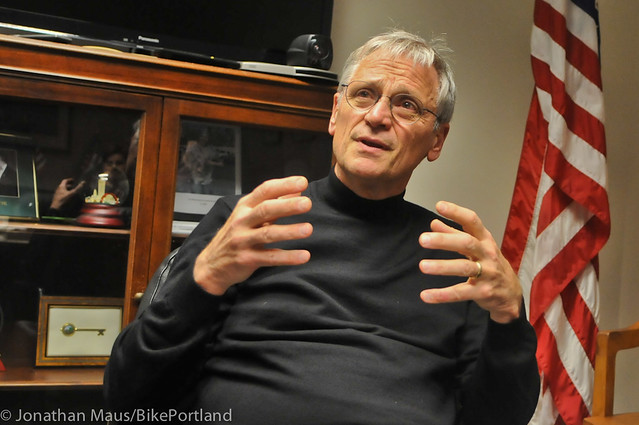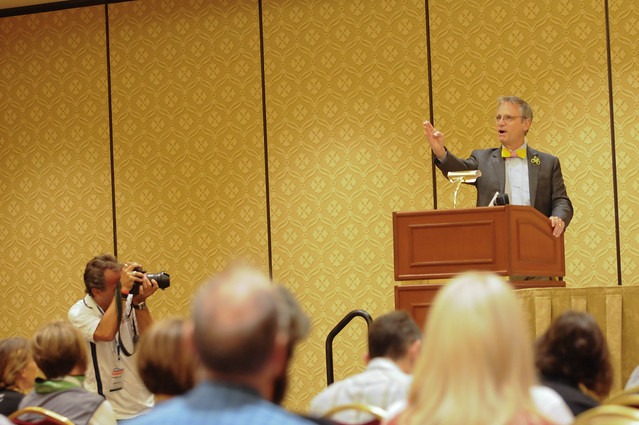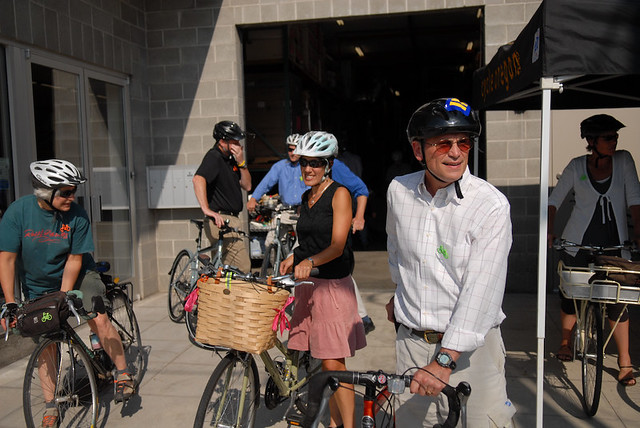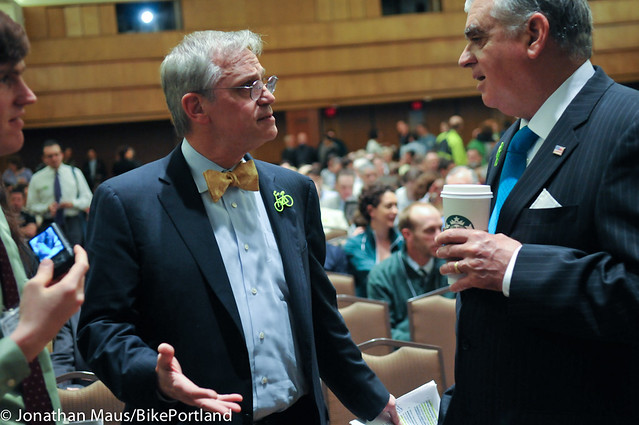
(Photos: J.Maus and M.Andersen/BikePortland)
The biggest problem in Earl Blumenauer’s professional life will never be holding onto his job. There aren’t many safer gigs in the country.
Instead, Blumenauer’s challenge is how to make his job count. And one way he’s done so has nothing to do with Congress.
“The people who played a critical role are either moving on to other positions, or they’re pretending to be retired, or they’re gone.”
— Congressman Earl Blumenauer on turnover in Portland civic leadership
A liberal congressman from one of the country’s most liberal districts — most of Portland — this federal politician has found a unique role for himself at the local level. Elected to the state legislature in 1972 at age 24, the 66-year-old Lewis and Clark grad has built his career from Salem to City Hall to the U.S. Capitol. But back home, his most important function might be this: he’s one of the few people in Portland politics who commands near-universal respect.
Blumenauer is popular despite his lack of actual executive power, and also because of it. While poor City Commissioner Steve Novick is stuck in the middle of a ten-way negotiation over the tax brackets of the Portland Street Fund, Blumenauer has been free to spend years floating above the local fray — whether that means hosting the come-to-Jesus meeting between city and county politicians that finally funded the Sellwood Bridge and Tilikum Crossing or letting his deafening silence about the Columbia River Crossing contribute to the death of the project. It’s an enviable role. And a very, very useful one.
Blumenauer’s job here in town, in short, is to be a professional elder statesman.
That’s why we jumped at the a chance to talk to him for an hour. This is a lightly edited transcript of the wide-ranging conversation in which we learned:
- He’s working as hard as he can to convince the city (not the city government, but the city) to turn the opening of Tilikum Crossing this September into a week-long festival for retelling the Portland story and getting Portlanders talking about their next big goal — whatever that will be.
- He thinks the city should have a plan in its back pocket for what the inner eastside would look like without I-5, to be ready on the day a giant earthquake hits.
- He’s very much aware of the stagnation of Portlanders’ biking and transit use, but his bigger worry runs deeper: he fears a stagnation in effective neighborhood activism.
- A few weeks ago he smuggled Salt & Straw ice cream into the White House situation room.
It’s a long read to kick off a couple weeks of year-end reflections and big thoughts here on BikePortland. So grab a warm beverage and enjoy a few solid minutes with the godfather of Portland urbanism.
BikePortland: This interview came out of a conversation with your staffer Andrew Plambeck, who said you’ve been trying to make sure Tilikum Crossing becomes a hinge rather than a finish line. We thought that was interesting.
Earl Blumenauer: It’s, what, 272 days until the bridge opens? [Editor’s note: Woah. It was 271.] When we cut the ribbon, move light rail to Milwaukie, close the streetcar loop, have buses, bikes, and pedestrians on that bridge, it will be the first time in over half a century that there is no federal project in the pipeline. No road, no bridge, no streetcar, no rail. And I don’t know that that’s fully set in with people. So I’ve made it kind of a personal mission in recent months to have people pay attention to that.
What about this bridge project is so important?
I have been spending a lot of time reflecting on some of the things I was involved with when I was commissioner of public works. Jumpstarting a pretty aggressive cycling program. The Central City Plan, which was my first major assignment when I got on the council. That was a 20-year plan that probably should have lasted 10 years. Well, it’s still pretty much intact now.
Most of the people who are here now are either new or have no memory of what happened since the early 70s: the killing of the Mount Hood Freeway, the passing of Senate Bill 100, and very dramatic activity here over the next two decades. I’m not certain how deep the awareness and the appreciation is.
Who’s our champion today? In my recognition, we always had a group and/or a person.
Usually both.
Yeah, usually takes both. I wonder who that is now for really quality bikeways or a network. I haven’t seen anyone step forth, either on Metro, the city or the state legislature. Do you think that’s a problem?
(Pauses.) My objective is to be everybody’s friend, where appropriate to provide some perspective. And I’m very interested in the conversations on the transition. Just as it’s the end of an era in terms of that federal-state-regional partnership, there are all of these institutions are in transition. The people who played a critical role are either moving on to other positions, or they’re pretending to be retired, or they’re gone.
And there are some extraordinarily talented and passionate people who are drawn to Portland or who stay here because of what’s happened. But they may not have a position in business, government, whatever. Another exciting aspect here is to make sure that the people who have become Portlanders by choice, in part because of the quality of life and what’s happened in the last 30 or 40 years, need to be integrated into who we are now and where we’re going.
Advertisement
This upcoming transition that you mentioned — does it provide the community with an opportunity to do things differently?
That remains to be seen. In terms of planning, it seems to me the city in the main has done a pretty good job. But there are issues of resources top to bottom. It’s a failure at the federal level that I’ve been spending a lot of time beating the drum and trying to change. We have not had a six-year comprehensive [federal transporation bill] reauthorization since 1997. Absent some leadership from this next legislature, or vote of the people or both, virtually all the state resources will go toward keeping what we have. Metro is essentially entirely dependent on a trickle of federal pass-through money.
The good news is that over the course of the last quarter-century, we’ve really turned the corner. Many of the development patterns and the revitalization, particularly downtown and in inner-city neighborhoods, are heavily dependent on the success of cycling. It’s also been more significant than I think has been generally understood — that enhancing and integrating this cycling experience is part of what’s added to the vitality and the cachet of Portland. I hear it repeatedly as I go to local businesses.
What we find around the country is that when you are looking at bigger-picture, next-step transitions, they don’t work unless they’re inclusive.
On that note: I look around the region — Southwest Corridor, Powell-Division — what Metro is looking to build is a lot like what we have been building. I’m struck by the fact that they approach transit projects as a default, both in their language and their process. I’m wondering if we’re not at the point where we can approach these things, maybe not as bike projects, but as multimodal projects.
There are all sorts of reasons we do things the way we do. Part of it is habit. Part of it is who we’ve got. We’ve not fully thought through how we’re able to have people feel they’re a part of the process to avoid a debacle like the Columbia River Crossing — which was never as good or as bad as people thought, but there was no vision. There was no buy-in, and it just kind of went along.
At this point, Congressman Blumenauer rose and offered both of us small cups of his personally branded Salt & Straw fruitcake ice cream. It’s pretty good.
We actually smuggled some of it into White House sitation rooms for a briefing on Iran. They check us for guns but not for ice cream.

For a lot of this year we’ve been writing about the idea of biking stagnation in Portland. Bikeway miles are flat. The number of riders are flat. Politics in city hall right now aren’t really great. There’s not a champion. There’s not a real vision. Do you think the word “stagnation” is fair?
Well, over the last 25 years we had a lot of momentum. You could argue that in some cases it was difficult to keep that trajectory going. We’ve had a very difficult six years in terms of infrastructure development and finance, here and nationally. But it is a challenge generally. Nationally there’s been great stuff that’s been happening with cycling in city after city, but the overall performance (here) hasn’t been on an upward trajectory. And it’s something we need to be clear-eyed about, not kid ourselves.
For some of us, the environment has improved. For my daily patterns in Washington and in Portland, it works really well. But not so much for the daily patterns of other people.
Why not?
We’ve been radiating [infrastructure] out from the center, but that has been somewhat situational. Some of the questions you’re hearing of late are about our north-south movement in the central city. Loss of auto parking gets some people’s backs up.
I’m hopeful that we’re going to continue on the development of the civic infrastructure. It was what prompted me to start the transportation class at Portland State in the first place.
Take Grand Avenue. Why do you think a cycle track wasn’t put in when the streetcar was?
It was not simple to get the streetcar there. People have huge investments in the road as it is. I think the people who are advocates, visionaries, need to be assessing where they’re going to have the most impact. I’ve long felt having another crossing — 7th street or something — would dramatically change the equation here in this general swath of land.
Back when I was in city council, I had proposed that one of the fallback provisions was not to move the freeway — which I thought we couldn’t afford — but the day when we could remove the freeway. I still think that if the big one comes and all of this liquifies and we have a vast landscape to reassess, alternative patterns in the central city may provide as much or more movement at less cost.
Part of what’s slowed the movement here is that it’s created a backlash. Not just here — it’s in other parts of the country. People have been able to play on some people’s concerns that they’re being left out. That they’re not being involved in the planning process. That their needs aren’t being addressed. And that’s fatal. Because it’s very easy in this country to stop something.
How do we fight the backlash?
The things we’ve been talking about. I want people to really appreciate where we are and how we got here, think about where we’re going and to recognize that we are all in this together. Which is why I want a signature event for everybody to be able to appreciate what it means. My personal goal is that it’s not a day, but it’s a weeklong celebration.
What about the need for local political champions?
“The last era had far more champions and key participants than is recognized. There are 300 or 400 all-stars that were there in the neighborhoods.”
— Blumenauer on 1970s activism
The last era [the 1970s] had far more champions and key participants than is recognized. Somebody will talk about a governor or mayor or whatever. All of these were part of an effort in this community for people to take back the city from Robert Moses. Whether it was the League of Women Voters coming in as a lonely voice to the City Council or whether it was early bike advocates or trolley jollies — I would venture there are 300 or 400 all-stars that were there in the neighborhoods.
This is as big a concern as any that I have: We may not have the breadth of the citizen engagement. Is it Bowling Alone? Are we too quick to be on blogs that reinforce our biases? There are a lot of people who have the luxury of celebrating success. I see people in coffee shops all over the city after their weekend ride or people at those vinyards that were going to be plowed under. We were going to have farmettes and subdivisions! They’re wine country now!
[The amount of civic engagement] is different. And I’m doing a lot of processing on that — just understanding what happened and how we can help. The broader the conversation, I think the better off we’re going to be.
Qs & As edited.






